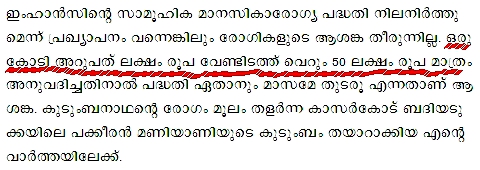New Draft Health Policy Of India: Comments by two public-health experts from Kerala.
Excerpts (total ~6 min audio in malayalam) of comments by Dr Ramankutty, Achutamenon Centre for Health Science Studies (~4min) and by Dr B Iqbal, public health activist and academic (latter 2 min) on the new draft health policy of India. The audio is extracted from a seminar on the challenges of public health care in India, organised as part of the state conference of the Communist Party of India (CPI) at Kottayam on 27th February 2015.
Mental health financing in Kerala State: an overview
The under-funding of Community Mental Health services in Kerala State gets media attention as District Mental Health Programs (DMHP) in certain districts are folding back because of lack of funds. Seen above are excerpts from a media report – article in Ente Vartha, Malayala Manorama on Friday 19 December 2014. (see PDF version here).
Another report (see pdf here) which highlight ‘central fund crunch in NRHM allocation’, says
The programmes of Institute of Mental Health and Neuro Sciences (IMHANS) Kozhikode, including community mental health programme, child development disability programme and child development services, which catered to thousands of patients in Kozhikode, Wayanad, Malappuram and Kasargod districts, are in trouble due to the fund crisis.
What is pertinent to note about such reports is that, matters relating to financing of mental health services, which are customarily relegated to the inaccessible policy spaces, are now becoming public debate. The report literally quotes figures like – What is needed is 1.6 crores, but what is provided is 50 lakhs. Such instability of funding is undoubtedly unsustainable for community mental health services in the state.
These facts are reflected in some technical reports as well -for example the WHO/WONCA report on primary care integration of mental health, dwells in detail on the inception (1999) and financing aspects of DMHP, Thiruvananthapuram. It says
Without an initial start-up grant from the national government, the programme would not have been implemented.
Following approval…by the national government, funds were allocated for an initial period of five years… At the end of the initial funding period, the state government was not able to earmark funds to continue the programme, although this was planned and expected by the central government. The programme continued by using some of the original funds that were not yet spent, and with financial support from the mental health centre …Now state funding for the programme has been secured for 2008 and 2009.
So, how much indeed, are the funds available for mental health services in the state? How is it being spent now? Where is it being spent? Are Community Mental Health services getting adequate funding? Or are most of the available funding going to institutional facilities? Lets explore…..
One way to get an overview about the “financing” aspects of mental health care delivery in the state would be to extract data from the annual plan (and the budget thereof) of Kerala State, which is available in the public domain. That is what, this write up will primarily do.
But before doing that lets us have a brief look at the fundamentals of mental health financing. This shall be in Page 2 (see icon below, can be skipped to proceed to main matter). It includes some basic definitions, about why to look at financing at all, and what are the key questions in financing which are relevant when we are thinking about the development of community mental health services.
We shall then zoom into the Kerala context and examine the current resource allocation pattern and look at the key questions that are relevant for the development and expansion of community mental health care in the state.This shall be in Page 3(click on page icon below). However you can grab a quick summary of the findings below.
Summary of findings on financing of mental health in Kerala Finding 1 In the absence of a strategic plan logically derived from the policy, the short term annual operational plans or the budget allocations themselves have become the defacto policy in Kerala. Such occurrence has been forewarned and recommended to be avoided in the WHO service package document on mental health financing(see Page2). Finding 2 Of every 100 Rupees of the health budget ear marked via line items for mental health care, only 12 Rupees of it is allotted for community mental health services in Kerala now. Finding 3 Persistent 'Contractualization' of staff in Community mental health services may relegate this service into an inferior cadre in comparison to staff in institutional facilities.

